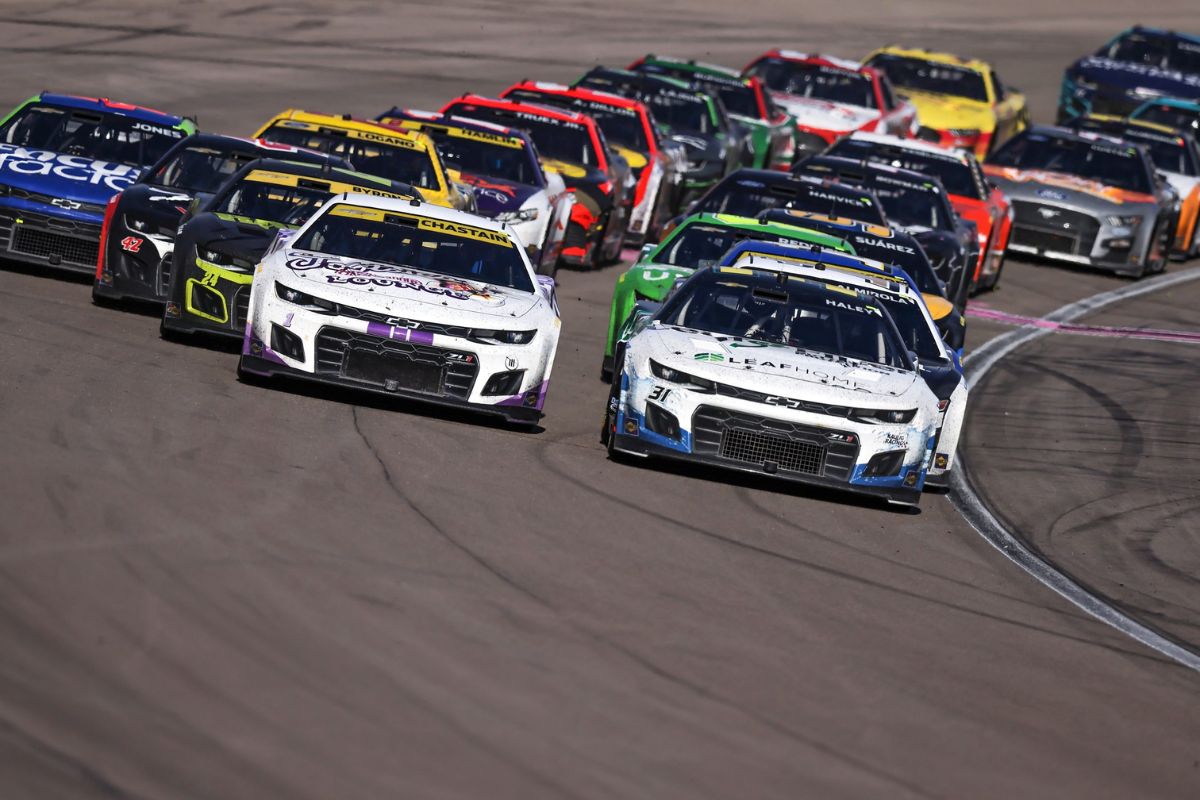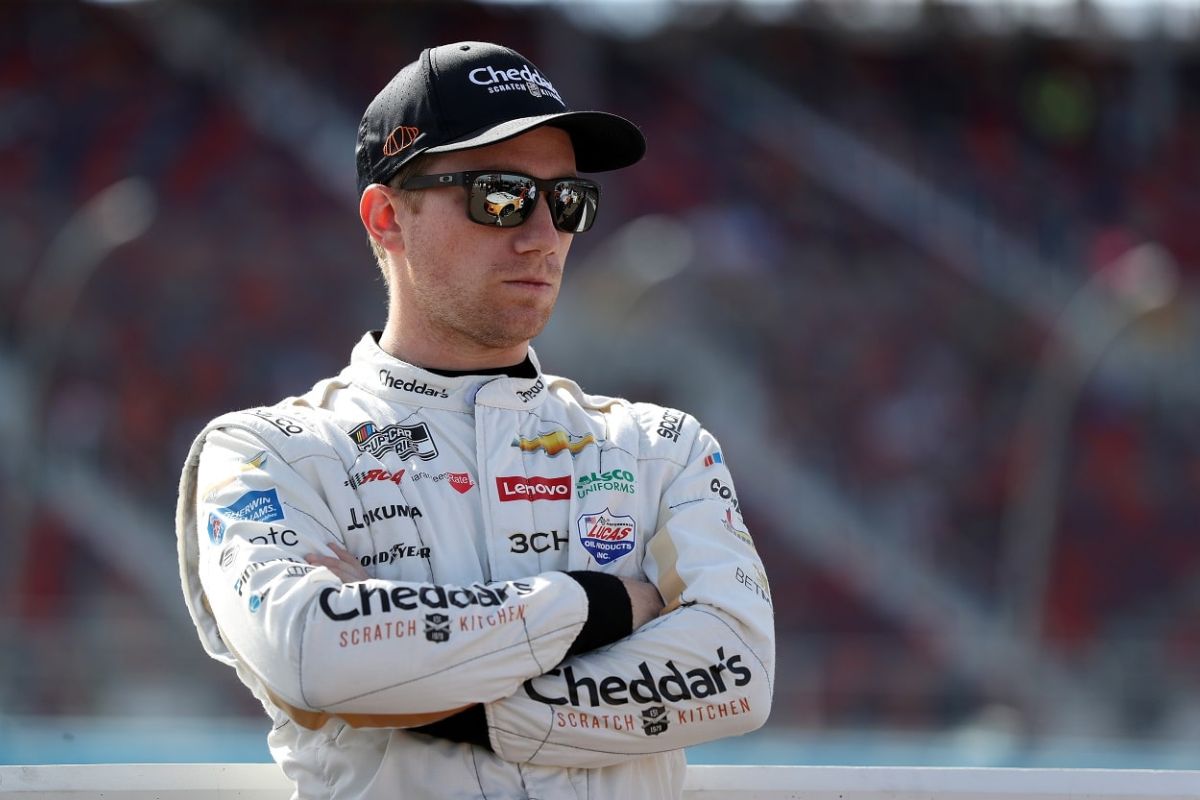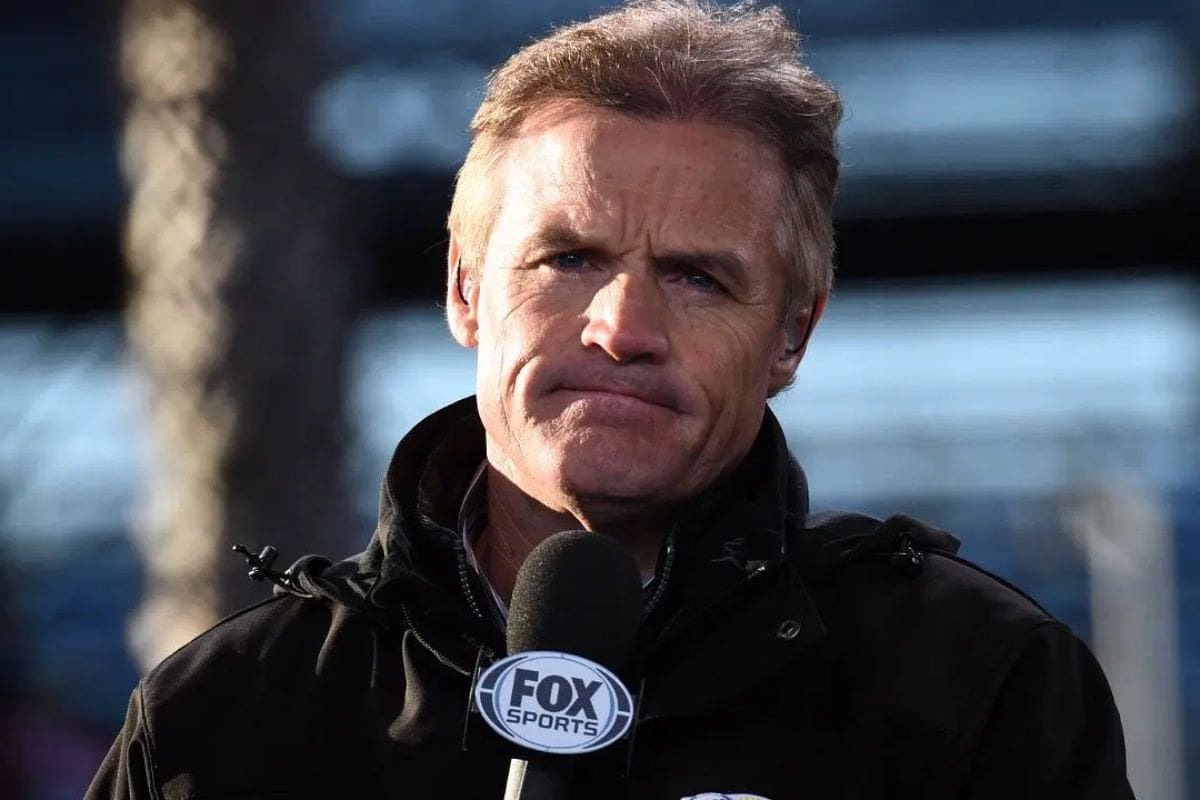Tyler Reddick’s Michigan Victory in Jeopardy: Tyler Reddick‘s recent victory at the Michigan International Speedway has sparked considerable debate, particularly following Kenny Wallace‘s critique of NASCAR’s management of the event. Wallace’s concerns center on the inconsistent application of rules and the controversial deployment of caution flags, which he argues undermined the race’s fairness and integrity. This situation not only raises questions about NASCAR’s governance but also highlights the broader implications for the sport as stakeholders grapple with issues of accountability and transparency.
Key Highlights
- Tyler Reddick’s victory is overshadowed by criticisms of NASCAR’s inconsistent governance and race management during the Michigan race.
- Kenny Wallace highlights NASCAR’s failure to enforce rules uniformly, leading to confusion and controversy over race outcomes.
- The frequent caution flags during the Michigan race disrupted competitive flow, raising questions about the fairness of the event.
- Incidents involving aggressive driving under caution have led to penalties, further complicating the narrative surrounding Reddick’s victory.
- NASCAR’s regulatory challenges and perceived inaction contribute to escalating tensions among drivers, impacting race dynamics and outcomes.
Overview of the FireKeepers Casino 400 and NASCAR’s Current Controversies
In the wake of Tyler Reddick’s success at the FireKeepers Casino 400, the NASCAR landscape is increasingly overshadowed by a series of emerging controversies that challenge the integrity and direction of the sport. The victory, while celebrated by Reddick and his team, unfolds against a backdrop of rising discontent among fans, analysts, and former racing legends who perceive a shift in NASCAR’s governance and operational ethos.
As the Cup Series approaches the end of its regular season, a crucial time traditionally marked by resolutions to numerous issues, the current climate diverges sharply from this precedent. This year, rather than addressing lingering concerns, NASCAR appears to be sidestepping critical discussions that could shape the sport’s future. This reluctance to engage with contentious matters has fueled skepticism regarding the governing body’s commitment to maintaining a competitive and transparent environment.
Key stakeholders within the NASCAR community are voicing their unease, suggesting that the organization’s inaction may undermine the credibility of the competition. The contrast of Reddick’s success against this backdrop raises questions regarding the implications of such controversies on individual performances and team strategies.
As NASCAR navigates this precarious moment, the focus must shift towards fostering a culture of accountability and constructive dialogue. The sport’s legacy hinges on its ability to adapt and respond to these challenges, ultimately reflecting the interests and concerns of its varied audience while preserving the essence of racing integrity.
Controversies at Michigan International Speedway
Amid the growing concerns surrounding NASCAR’s governance, the race at Michigan International Speedway further exacerbated the situation, illustrating the complexities inherent in the sport’s current landscape. The anticipation leading up to the event was palpable, especially after the contentious atmosphere surrounding the previous race at Richmond Raceway. Fans and participants similarly hoped for a race unmarred by controversy; however, the conditions at Michigan proved otherwise.
The race was initially delayed due to rain, pushing the start time back a day and heightening expectations for a clean and orderly event. Once the green flag ultimately waved, it quickly became evident that the race would not be devoid of disputes. Numerous incidents on the track, compounded by decisions from race officials, sparked debates among drivers and fans.
The enforcement of racing rules appeared inconsistent, leading to questions about NASCAR’s regulatory framework. Additionally, the absence of clarity regarding caution periods ignited discussions about fairness and competitiveness.
These controversies not only overshadowed the race but also highlighted a broader concern regarding NASCAR’s operational integrity. The lack of a definitive resolution to the issues raised during the event left many in the racing community unsettled.
As Tyler Reddick’s victory came under scrutiny, the race at Michigan International Speedway became representative of an urgent need for NASCAR to re-evaluate its governance and communication processes. The implications of these controversies extend beyond a single event, threatening the trust and enthusiasm of the sport’s loyal fanbase.
Kenny Wallace’s Take on Tyler Reddick’s Win and NASCAR’s Caution Issues
Kenny Wallace, a veteran of the NASCAR circuit, has emerged as a significant voice in the ongoing discussion surrounding Tyler Reddick’s victory at Michigan International Speedway and the persistent caution issues plaguing the sport.
Wallace’s insights highlight the complexities of the race, particularly the impact of caution flags that have not only shaped the outcome but also raised questions about the sport’s integrity.
- Caution Frequency: The race featured several cautions, disrupting the competitive flow and intensity, mirroring issues seen at other venues like Richmond Raceway.
- Key Incident: The critical moment came when Martin Truex Jr. hit the outer wall, leading to an overtime scenario that fundamentally altered the race dynamics.
- Reddick’s Performance: Prior to the cautions, Tyler Reddick showcased exceptional speed, leading multiple laps and demonstrating the skill of his 23XI Racing team.
Wallace acknowledges Reddick’s deserving win, stating, “He was the fastest car, so no doubt Tyler Reddick is the winner.”
However, he emphasizes that the excessive cautions detracted from the race’s authenticity. By allowing for frequent interruptions, NASCAR risks diminishing the value of skill and strategy that are essential for success in motorsports.
“So Michael Jordan owns Tyler Reddick’s race car and had McDonald’s on it. It looked good showed up good today, but Tyler Reddick wins at Talladega about three months ago with Michael Jordan there, right? Michael Jordan was at the race at Talladega, well Michael Jordan was at the race yesterday on Sunday, but it rains out, so he goes home. Michael, he might have had something to do today so we can’t rough him up too bad. Michael Jordan might have had something to do on this Monday. He goes home, and his car wins today.” – wallace
As the discussion unfolds, it becomes clear that the integrity of race outcomes is at stake, necessitating a reevaluation of caution flag utilization.
Wallace’s Thoughts on NASCAR’s Caution Flags and Spotters
Caution flags have become a focal point of dispute in NASCAR, with Kenny Wallace articulating concerns about their frequency and the role of spotters in flagging incidents. Wallace argues that NASCAR may be too quick to throw caution flags, driven by an inherent desire for entertainment. This tendency, he believes, transforms races into situations ripe for potential wrecks as drivers regroup after cautions.
In his analysis, Wallace points to a specific problem: the communication between NASCAR and spotters. Spotters, tasked with monitoring the track, can sometimes contribute to unnecessary cautions. Their reports on debris, he argues, often lead to flags being thrown prematurely, creating an environment where the potential for accidents increases.
“Is NASCAR guilty of throwing the caution flag too quick? Yes, yes, they are. I think yes, I think NASCAR gets a little caution flag happy because there’s an old saying there’s nothing better in a NASCAR race than a caution flag to wall them all up for them to try to wreck again.” – Wallace
Wallace’s criticisms invite a broader discussion on the balance between maintaining excitement in racing and ensuring the safety of drivers, suggesting a need for a more measured approach from both NASCAR and its spotters.
“NASCAR employs these spotters. Their job is to go ‘breaker one nine I see debris on the racetrack’ that’s my mouse, by the way. So, these spotters’ job is to say okay you know Martin Truex hits the wall there’s debris and that debris could be dangerous could flatten other people’s tires. I think they do throw caution flag a little fast. I think where there could have been debris is in no-man’s-land, anyway. It’s up there 3 feet from the wall.” – Wallace
The Impact of Cautions on Racing and Wrecking Incidents
The influence of caution flags on racing dynamics cannot be understated, as they often introduce a host of tactical complications and intensified tensions among drivers. These flags serve as a double-edged sword, breaking the rhythm of the race while simultaneously amplifying the urgency to capitalize on opportunities, ultimately increasing the likelihood of wrecking incidents.
The historical context of cautions reveals a pattern where desperation overtakes strategy, leading to aggressive actions that can spiral into chaos.
- Disruption of Momentum: Cautions disrupt the flow of racing, forcing drivers to recalibrate their strategies, which can lead to impatience and reckless driving as they attempt to regain lost positions.
- Heightened Competition: The close proximity of cars during restarts breeds an environment ripe for conflict. As seen in incidents involving Austin Dillon and Denny Hamlin, the strain to advance often results in retaliatory actions that escalate quickly.
- Risk of Penalties: Drivers like Carson Hocevar face noteworthy repercussions when caution-induced incidents occur. The imposition of fines and point deductions serves as a glaring reminder of the risks associated with aggressive racing behavior during cautions.
News in Brief: Tyler Reddick’s Michigan Victory in Jeopardy
The scrutiny surrounding Tyler Reddick’s victory at Michigan International Speedway highlights considerable concerns regarding NASCAR’s governance and rule enforcement. Kenny Wallace’s criticisms shows the detrimental effects of inconsistent caution flag management and its implications for race integrity. This situation reflects a larger discontent among stakeholders, raising critical questions about NASCAR’s operational practices and accountability. Addressing these issues is vital for restoring trust and ensuring the sport’s future direction aligns with competitive fairness and integrity.
ALSO READ: Tyler Reddick’s Michigan Win Celebration Gets Wet and Wild




NASCAR is going to the slowly Kil itself
All the crying is getting old.